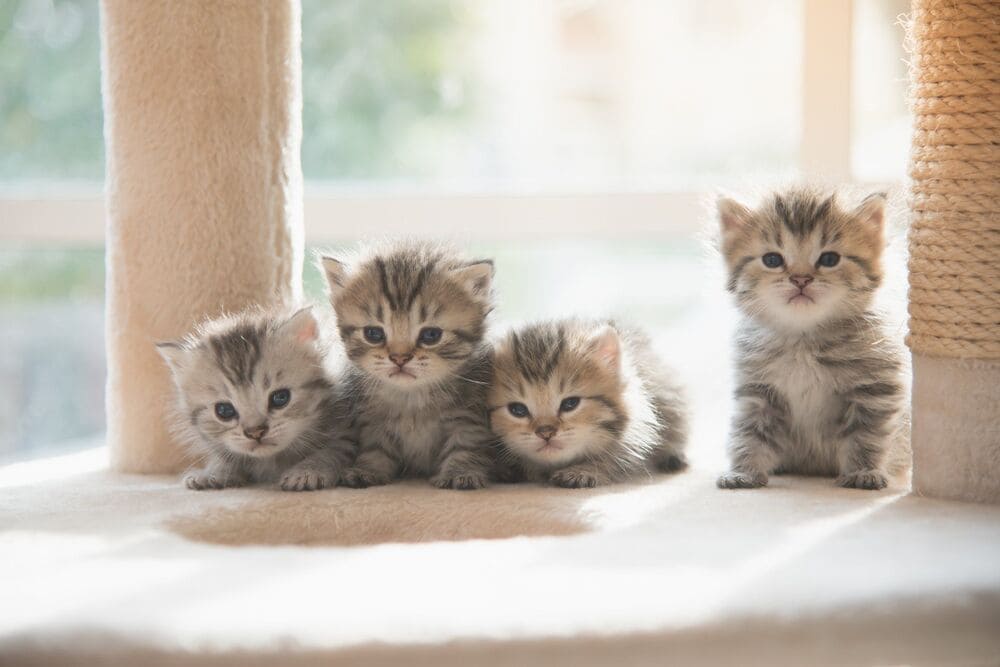
Keeping your kitten healthy is a priority for veterinarians and owners alike. Navigating the ins and outs of routine health care may seem a bit daunting, but, as always, Longwood Veterinary Center is here to help. Routine vaccinations are essential to keeping your kitten healthy into adulthood. Determining which vaccines your kitten should receive is based upon your pet’s projected lifestyle and the lifestyle of other cats sharing the household.
Common Diseases of Concern
Rhinotracheitis:
This disease is caused by the common feline herpes virus. Affected kitties or older cats suffer from upper respiratory signs, including fever, sneezing, watery eyes, and severe congestion. Severely affected kittens may develop painful ulceration of the mouth and corneal ulceration. Affected kittens may become severely ill, stop eating, become dehydrated and even perish if not treated. Most of the time, the signs of illness last for approximately a week (5-10) days but may become more chronic. Affected cats may shed the virus into the environment for weeks to months after becoming infected. The virus is passed from cat to cat by sneezing, direct contact, or sharing infected bedding, food dishes, or cages.
Calicivirus:
This virus is similar to the herpes virus in that it can cause upper respiratory signs such as sneezing and inflammation of the sinuses. Sometimes affected cats will also develop sores in the mouth, making eating painful. Some strains of the virus may cause fluid build-up in the lungs and/or pneumonia. It is often difficult to distinguish a calicivirus infection from a herpes virus infection as the signs may be similar.
Panleukopenia:
This disease is often referred to as feline distemper or feline infectious enteritis and is caused by a type of parvovirus. Affected kittens, especially those under five months of age, may become severely ill and may die. In some affected kittens, the virus causes a dangerously low white blood cell count as well as fever, vomiting, loss of appetite, and lethargy. In addition, pregnant queens infected with the virus may have stillborn or mummified fetuses or their kittens may be born with difficulty walking and tremors due to the virus’ effect on the developing cerebellum. Interestingly enough, many affected cats and kittens may show no signs or very mild signs. The disease is spread from direct cat-to-cat contact, contact with infected feces, or contact with objects that have been exposed to the virus.
How to Protect your Cat or Kitten
How does one protect their cat or kitten from the above viruses and the significant diseases they may cause? Fortunately, there are safe and effective vaccines available to protect your furry friend. We recommend kittens receive their FVRCP vaccine, a combination vaccine that protects against all of the above diseases, at ages 8 weeks, 12 weeks, and 16 weeks. At one year of age, the FVRCP is boostered again, and that booster is repeated every three years.
Other Diseases of Concern
Feline Leukemia:
Feline leukemia is a retrovirus that causes the suppression of a cat’s immune system. Signs of infection may take weeks or longer to present themselves. Symptoms include fever, weight loss, lethargy, inflammation of the gums and mouth, chronic, recurrent upper respiratory, urinary, and skin infections, and life-threatening anemia. Some infected cats will go on to develop leukemia (a cancer of white blood cells), lymphoma, or lymphosarcoma. Cats become infected when saliva, nasal secretions, urine, or fecal material are transferred between cats. This usually occurs via biting, grooming, fighting, or sharing food or litter boxes. The virus is not very hardy outside of the host; it is not particularly infectious. However, cats with FeLV can shed the virus chronically and risk infecting other cats. Not all cats exposed to the virus will go on to develop disease due to that exposure. Some 70% of exposed cats will clear the virus on their own. Unfortunately, of the cats that do develop the disease, the majority will die within one to four years of infection. Vaccination against FeLV is very effective at preventing the disease. Outdoor cats are at high risk and absolutely require vaccination. Kittens should be vaccinated at 12 weeks, 16 weeks, one year of age, and then yearly thereafter.
Rabies:
Rabies is a universally fatal neurologic disease caused by the rabies virus. All mammals are susceptible to rabies. Cats are usually infected after contact with an infected rabid wild animal. The virus is spread through contact with infected saliva via an open wound, through a bite, or into the eyes or mouth. Clinical signs of rabies infection include a change in attitude, lethargy, agitation, difficulty walking, aggressive behavior, drooling, and inability to eat or drink. This is a disease that can be easily prevented by a safe and effective vaccine.
At Longwood Vet Center, kittens are vaccinated at 16 weeks and one year of age. After that, they are vaccinated yearly. Please call to get your kitten or adult cat vaccinated today. Effective, safe vaccines help extend your pet’s life and keep your pet happy and healthy.
